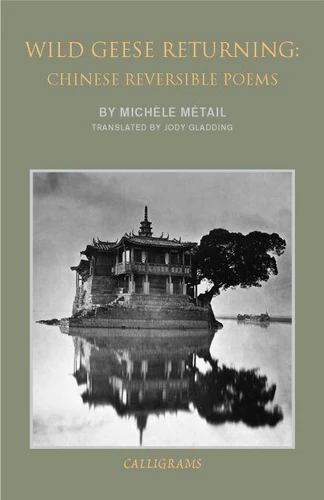Wild Geese Returning. Chinese Reversible Poems
Par : , ,Formats :
Disponible dans votre compte client Decitre ou Furet du Nord dès validation de votre commande. Le format ePub protégé est :
- Compatible avec une lecture sur My Vivlio (smartphone, tablette, ordinateur)
- Compatible avec une lecture sur liseuses Vivlio
- Pour les liseuses autres que Vivlio, vous devez utiliser le logiciel Adobe Digital Edition. Non compatible avec la lecture sur les liseuses Kindle, Remarkable et Sony
- Non compatible avec un achat hors France métropolitaine
 , qui est-ce ?
, qui est-ce ?Notre partenaire de plateforme de lecture numérique où vous retrouverez l'ensemble de vos ebooks gratuitement
Pour en savoir plus sur nos ebooks, consultez notre aide en ligne ici
- Nombre de pages312
- FormatePub
- ISBN978-962-996-816-8
- EAN9789629968168
- Date de parution28/03/2017
- Protection num.Adobe DRM
- Taille128 Mo
- Infos supplémentairesepub
- ÉditeurNew York Review Books
Résumé
A breathtaking introduction to Chinese multidirectional poems, told through the story of Su Hui, the greatest writer of these poems who embroidered a silk with 840 characters--equaling as many as 12, 000 multidirectional poems--for her distant husband. For nearly two thousand years, the condensed language of classical Chinese has offered the possibility of writing poems that may be read both forward and backward, producing entirely different creations.
The genre was known as the "flight of wild geese, " and the poems were often symbolically or literally sent to a distant lover, in the hope that he or she, like the migrating birds, would return. Its greatest practitioner, and the focus of this critical anthology, is Su Hui, a woman who, in the fourth century, embroidered a silk for her distant husband consisting of a grid of 840 characters. No one has ever fully explored all of its possibilities, but it is estimated that the poem-and the poems within the poem-may be read as many as twelve thousand ways.
Su Hui herself said, "As it lingers aimlessly, twisting and turning, it takes on a pattern of its own. No one but my beloved can be sure of comprehending it." With examples ranging from the third to the nineteenth centuries, Michèle Métail brings the scholarship of a Sinologist and the playfulness of an avant-gardist to this unique collection of perhaps the most ancient of experimental poems.
The genre was known as the "flight of wild geese, " and the poems were often symbolically or literally sent to a distant lover, in the hope that he or she, like the migrating birds, would return. Its greatest practitioner, and the focus of this critical anthology, is Su Hui, a woman who, in the fourth century, embroidered a silk for her distant husband consisting of a grid of 840 characters. No one has ever fully explored all of its possibilities, but it is estimated that the poem-and the poems within the poem-may be read as many as twelve thousand ways.
Su Hui herself said, "As it lingers aimlessly, twisting and turning, it takes on a pattern of its own. No one but my beloved can be sure of comprehending it." With examples ranging from the third to the nineteenth centuries, Michèle Métail brings the scholarship of a Sinologist and the playfulness of an avant-gardist to this unique collection of perhaps the most ancient of experimental poems.
A breathtaking introduction to Chinese multidirectional poems, told through the story of Su Hui, the greatest writer of these poems who embroidered a silk with 840 characters--equaling as many as 12, 000 multidirectional poems--for her distant husband. For nearly two thousand years, the condensed language of classical Chinese has offered the possibility of writing poems that may be read both forward and backward, producing entirely different creations.
The genre was known as the "flight of wild geese, " and the poems were often symbolically or literally sent to a distant lover, in the hope that he or she, like the migrating birds, would return. Its greatest practitioner, and the focus of this critical anthology, is Su Hui, a woman who, in the fourth century, embroidered a silk for her distant husband consisting of a grid of 840 characters. No one has ever fully explored all of its possibilities, but it is estimated that the poem-and the poems within the poem-may be read as many as twelve thousand ways.
Su Hui herself said, "As it lingers aimlessly, twisting and turning, it takes on a pattern of its own. No one but my beloved can be sure of comprehending it." With examples ranging from the third to the nineteenth centuries, Michèle Métail brings the scholarship of a Sinologist and the playfulness of an avant-gardist to this unique collection of perhaps the most ancient of experimental poems.
The genre was known as the "flight of wild geese, " and the poems were often symbolically or literally sent to a distant lover, in the hope that he or she, like the migrating birds, would return. Its greatest practitioner, and the focus of this critical anthology, is Su Hui, a woman who, in the fourth century, embroidered a silk for her distant husband consisting of a grid of 840 characters. No one has ever fully explored all of its possibilities, but it is estimated that the poem-and the poems within the poem-may be read as many as twelve thousand ways.
Su Hui herself said, "As it lingers aimlessly, twisting and turning, it takes on a pattern of its own. No one but my beloved can be sure of comprehending it." With examples ranging from the third to the nineteenth centuries, Michèle Métail brings the scholarship of a Sinologist and the playfulness of an avant-gardist to this unique collection of perhaps the most ancient of experimental poems.
















